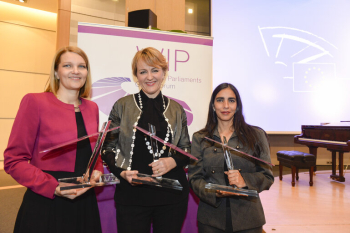
The integration of Ukraine into the European Union is an important component of Kyiv's current policy. However, economic integration and rapprochement
with the EU require candidate countries to fulfill a number of requirements, one of which is to carry out tax reforms to harmonize domestic tax rules and laws with European standards and norms. Acute problems in the fiscal system have been identified, the limitation of funding for the social sector, frequent amendments to legislative acts, obstacles, restrictions, and prohibitions on entrepreneurial activity, and a high level of corruption.
It should be noted that the European Union itself is engaged in a tense fight against corruption. In one of the programmatic documents of the European Commission, published on May 3, 2023, an up-to-date program to combat this phenomenon in the 27 countries of the bloc was presented.
The new set of measures includes new and strengthened rules for criminal liability for corruption offenses and harmonized penalties across the EU, as well as a proposal by the High Representative, supported by the Commission, to create a special sanctions regime under the Common Foreign and Security Policy (CFSP) for serious acts of corruption worldwide. These new measures pay particular attention to prevention and the creation of a culture of integrity, in which corruption is unacceptable, while at the same time strengthening enforcement tools.
Key elements of proposals:
- Anti-corruption Communication. There is zero tolerance for corruption in EU institutions. The communication details the rules of ethics, integrity, and transparency that are in place to prevent corruption in EU institutions. This framework must not only be applied strictly and consistently but also be continuously updated.
- Stricter Anti-Corruption Rules. The Commission proposes a new Anti-Corruption Directive.
The proposal modernizes the existing EU anti-corruption legislative framework by:
- a) Preventing corruption and fostering a culture of integrity Raising awareness of corruption through information and educational campaigns, research, and educational programs to reduce corruption risks and offenses. Ensuring the accountability of the public sector to the highest standards by requiring Member States to adopt effective rules regarding open access to information of public interest, disclosure, and management of conflicts of interest in the public sector, disclosure, and verification of public officials' assets, and regulation of interactions between the private and public sectors. Establishing specialized anti-corruption bodies and providing adequate resources and training to the authorities responsible for preventing and combating corruption.
- b) A Single Legal Act for All Corruption Offenses and Penalties. Harmonizing the definitions of criminal offenses prosecuted as corruption to cover not only bribery but also embezzlement, abuse of influence for personal gain, abuse of office, as well as obstruction of justice and illicit enrichment related to corruption offenses. The proposal makes all offenses under the UN Convention against Corruption mandatory under EU law and unifies corruption in the public and private sectors. Increasing the level of criminal sanctions for individuals and legal entities, as well as harmonizing aggravating and mitigating circumstances.
- c) Ensuring effective investigation and prosecution of corruption offenses Investigation tools: Member States will need to ensure that law enforcement agencies and prosecutors have the necessary investigative tools to combat corruption. Immunity or privileges from investigation and prosecution: Member States must ensure that privileges and immunities can be lifted during corruption investigations through an effective and transparent process established by law and in a timely manner. Introducing minimum standards for the statute of limitations to ensure sufficient time to prosecute corruption offenses.
In October 2023, former European Commission President Jean-Claude Juncker stated that Ukraine is currently not ready to become a member of the European Union due to corruption. In May 2024, German Justice Minister Marco Buschmann called corruption a significant issue for Ukraine, emphasizing the country's European future. "The issue of corruption is a triple problem for Ukraine. First, every euro spent on corruption instead of equipping soldiers weakens Ukraine's defense against Russian aggression," the German official explained.
I have already noted that the fight against corruption in Ukraine is quite costly for taxpayers. Especially considering the low level of effectiveness demonstrated by the current anti-corruption bodies. It can be assumed that the reason for this is lack of experience of recently established entities.
Unfortunately, the work of non-governmental organizations, which declare their goal to overcome corruption, also turns out to be ineffective. Often, their activities are not of a systemic nature, but are aimed at exposing the corrupt actions of individual officials. Formally, it looks like a fight against corruption. But the focus on personalities does little to overcome corruption itself as a phenomenon that has quite obvious causal nature.
The institutional origins of corruption lie in the extraordinary structural and legal complexity of Ukraine's governance system, the abundance of ambiguities in regulatory norms, and the excessive discretionary powers of officials.
The rule of corruption within power has always looked, and still looks, like this: an official is always more inclined toward criminal activity because, compared to a businessman, this very criminal activity is almost the only way for an official to increase their wealth. And, the more complex the state power system is, the more regulatory norms and ambiguities in their interpretation, the more corruption appetites of the bureaucracy are aroused. Reducing the overregulation of the economy, respectively, will reduce the corruption opportunities of the authorities.
Understanding this, the state policy on combating corruption should be based on the following principles:
- Clarity of laws and their provisions. The less opportunity an official has to influence decision-making through the ability to interpret the provisions of the law articles differently, the less likely it is that they can demand and receive a bribe for making a "correct decision";
- Maximum simplification of various administrative and permitting procedures, their gratuity, and speed of execution. This situation destroys one of the main drivers of corruption—the opportunity to receive any public service from the state faster and, sometimes, cheaper than the law allows;
- Maximum reduction of the influence of informal relations, informal internal hierarchies on the work of government departments. As a protective measure, regular internal audits could be introduced in order to reveal the nature and degree of influence of non-official relations on government departments functioning;
- Establishing a system of benefits and preferences for officials and their family members, which should compensate for the prohibition of engaging in commercial activities and certain restrictions on such activities for their family members due to possible conflicts of interest. These may include special conditions for receiving educational services (for the official and their family members), additional paid leave, official housing (which may sometimes remain with the official's family even after retirement), increased pensions, parking for personal vehicles near the office, etc. The official loses all these benefits and must repay the full amount of what the budget spent on them if a court finds them guilty of corruption. This is how the system of incentives and accountability works;
- Simplification of the tax system eliminating ambiguity of norms, introducing fair taxation criteria and predictability of tax legislation. This will minimize the ability of authorities to put pressure on private business for corruption benefits, as well as improve the business and investment climate in the country;
- Completion of the reform of the judicial and the law enforcement system of Ukraine, and this reform should concern not only institutional and legal transformations, but also requires changes in the system of professional training.
This is a powerful systemic work at different levels of government. Long-term and painstaking. Instead, in Ukraine, they continue to fight the consequences of corruption and shape public opinion that "it is enough to replace all the bad officials with good ones — and corruption will disappear." No, nothing like that will happen.
Dr Dmytro Sobolyev, Senior Advisor of the Center for European Democracy Studies

















